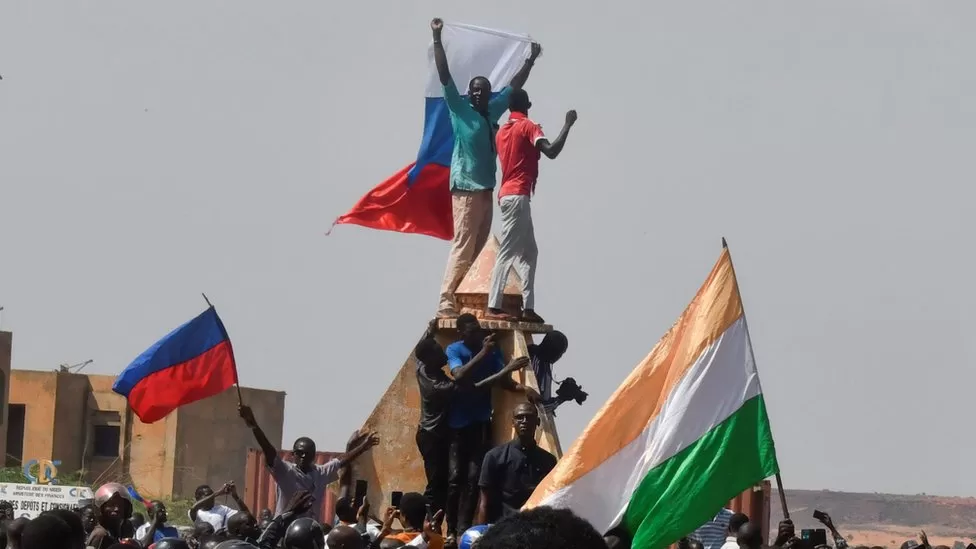In a sign of growing hatred towards the West since the coup in Niger, a businessman proudly shows off his outfit in the colors of the Russian flag in the traditional heartland of deposed President Mohamed Bazoum.
The military and the West have been at odds since the Niger coup.
Mr. Bazoum was a loyal Western ally in the war against radical Islamists, as well as a reliable economic partner.
Niger is home to a French military base and the world’s seventh-largest uranium production.
The fuel is critical for nuclear power, with one-quarter flowing to Europe, particularly former colonial power France.

General Abdourahamane Tchiani deposed the president in a coup on July 26, and Russian flags suddenly appeared on the streets.
On Sunday, thousands of people protested in Niamey’s capital, brandishing Russian flags and even attacking the French consulate.
Also read: ‘Coup attempt’ in Niger: Here’s what we know so far
This “movement” appears to be growing across the country.
The businessman, who lives 800 kilometers (500 miles) away in Zinder’s capital city, asked that his face be blurred for safety reasons.
“I’m pro-Russian, and I don’t like France,” he declared. “I’ve been opposed to France since I was a child.”
“They’ve exploited all the riches of my country such as uranium, petrol and gold. The poorest Nigeriens are unable to eat three times a day because of France.”
Thousands of people turned up in Zinder on Monday to support the military takeover, according to the businessman.
He said that he had hired a local tailor to design an outfit for him out of material in Russian colors of white, blue, and red and that it had not been paid for by pro-Russian organizations.
Niger has a population of 24.4 million people, with two out of every five people living in extreme poverty on less than $2.15 a day.
President Bazoum took office in 2021, marking Niger’s first democratic and peaceful power change since independence in 1960.
His government, on the other hand, was a target for Islamist militants allied to the Islamic State group and al-Qaeda who roamed across sections of the Sahara Desert and the semi-arid Sahel to the south.
Under Islamist pressure, troops in adjacent Mali and Burkina Faso, both former French colonies with significant French interests, seized control in recent years, claiming it would aid in the war against terrorists.
Both of these countries, like Niger, previously had considerable numbers of French troops assisting them, but as the Islamist attacks persisted, anti-French sentiment surged across the area, with citizens in all three accusing the French of not doing enough to stop them.
Once in power, the Mali junta welcomed Russia’s mercenary Wagner Group, which first drove out French forces and then pressed for the departure of thousands of UN personnel.
Despite continuous Islamist attacks in Mali, Burkina Faso’s junta has grown closer to Russia and evacuated hundreds of French troops.
Mr Bazoum’s regime in Niger frequently banned anti-French protests.
Several civil society organizations began to escalate anti-French protests in mid-2022 when Mr Bazoum’s administration accepted the relocation of France’s Barkhane forces to Niger after they were asked to leave Mali.
Among these is the M62 movement, which was founded in August 2022 by a coalition of activists, civil society organizations, and labor unions.
They spearheaded protests over growing living costs, inadequate governance, and the presence of the French military.
The group’s planned protests were prohibited or forcibly suppressed by Niger’s authorities, with its leader Abdoulaye Seydou imprisoned for nine months in April 2023 for “disrupting public order.”
The M62 appears to have been rejuvenated in the aftermath of President Bazoum’s resignation.
In a rare move, its members were quoted by state TV calling for large protests in support of the junta and opposing sanctions imposed by West African nations in response to the coup.
It is unclear whether the organization is affiliated with the National Council for Safeguarding the Homeland (CNSP) or with Russia.
However, it was the umbrella group that organized Sunday’s protest, which was also attended by smaller civil society groups such as the Coordination Committee for the Democratic Struggle (CCLD) Bukata and Youth Action for Niger.
Back in Zinder, the pro-Russian businessman is optimistic about Moscow’s ability to assist his motherland.
“I want Russia to help with security and food,” he explained. “Russia can supply technology to help us improve our agriculture.”
Moutaka, a farmer who also resides in Zinder, disagrees, claiming that the coup is bad news for everyone.
“I don’t support the arrival of Russians in this country because they are all Europeans and nobody will help us,” he said. “I love my country and hope we can live in peace.”
